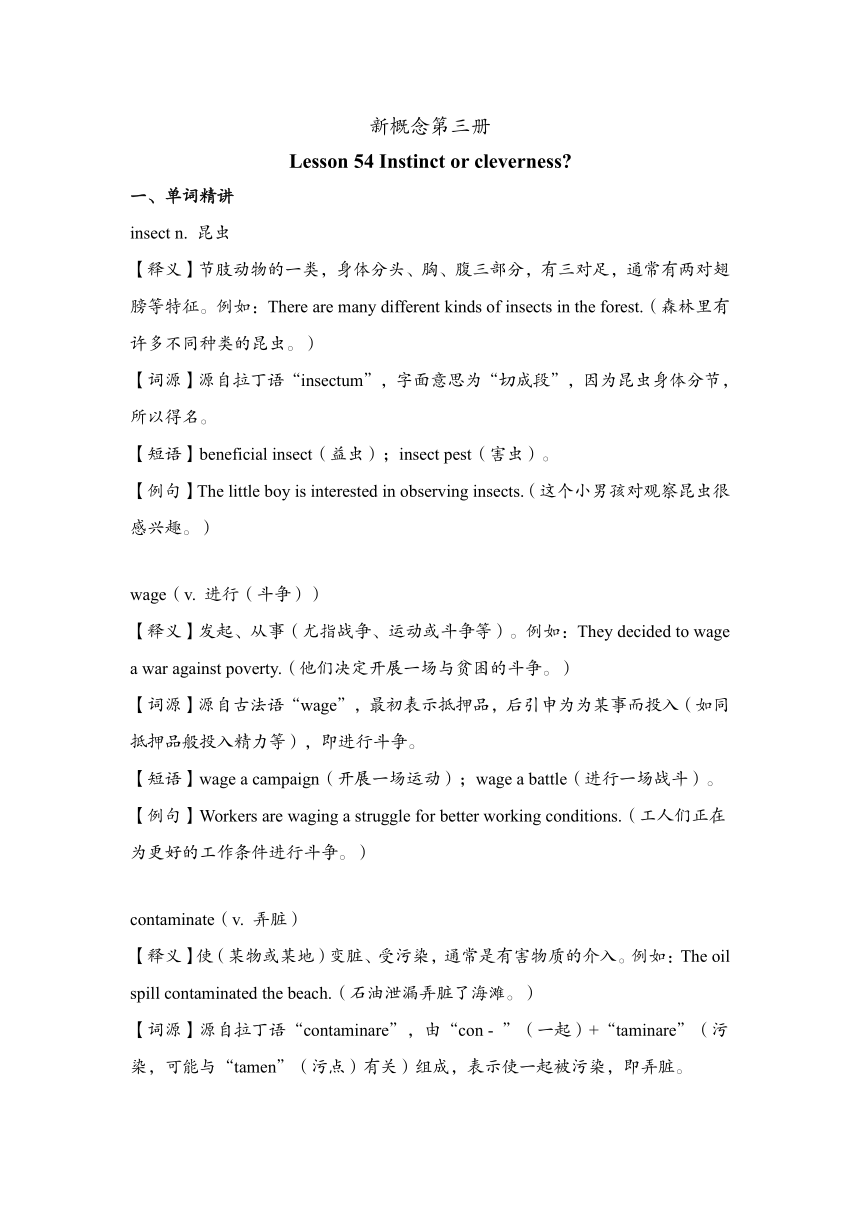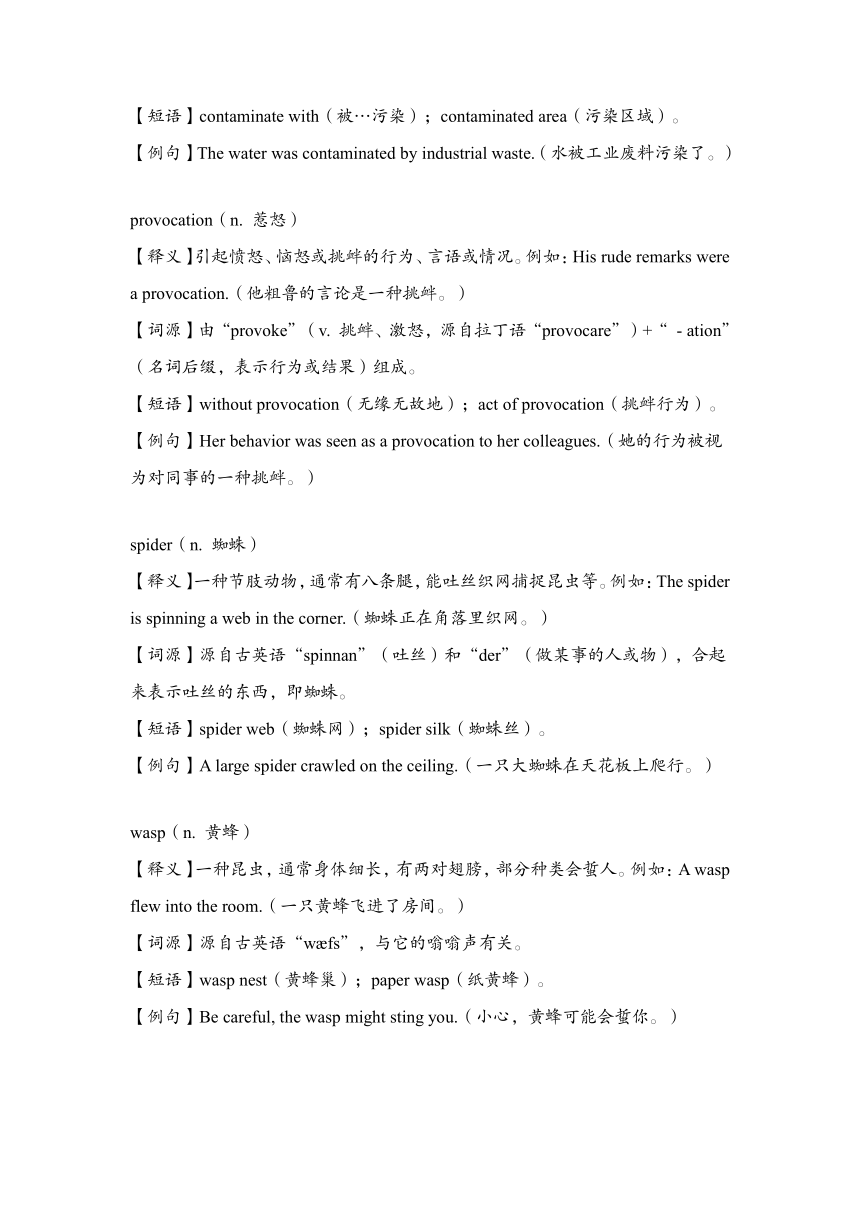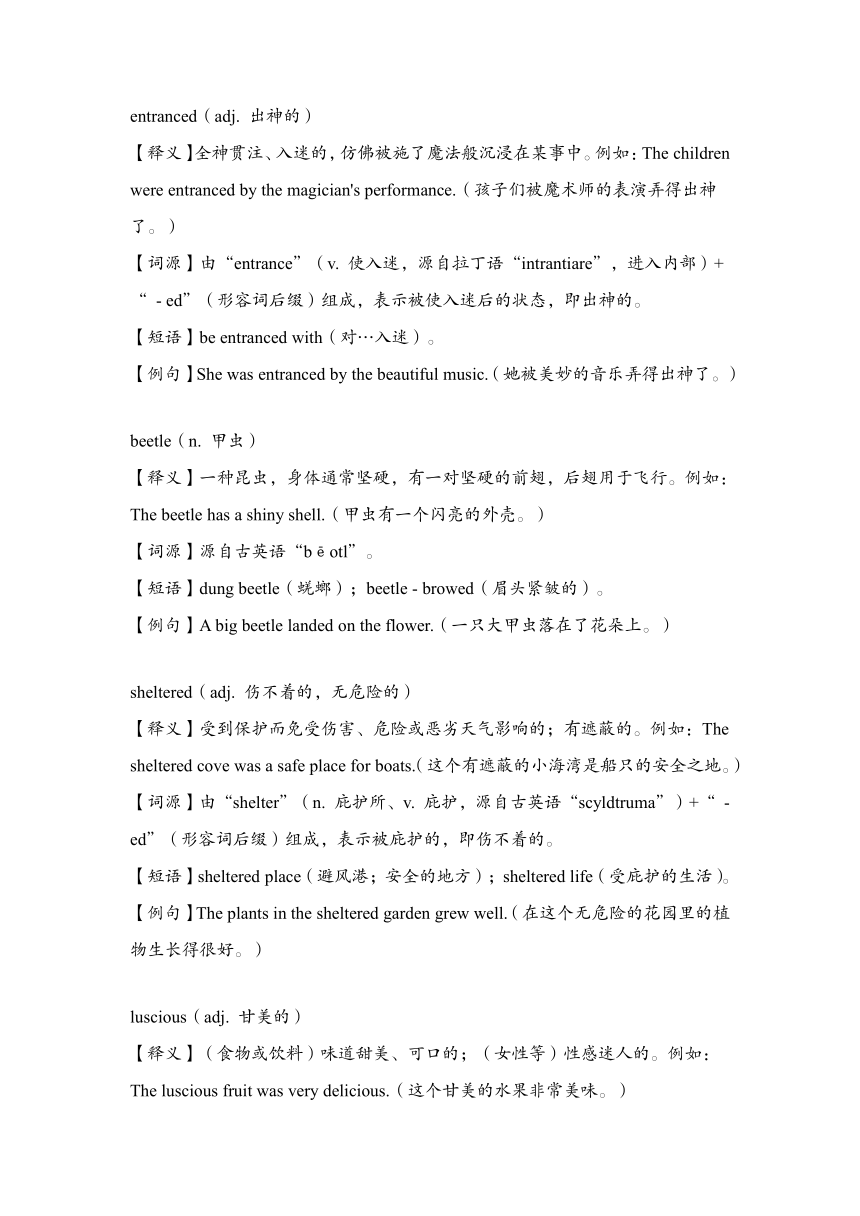新概念第三册 Lesson 54 Instinct or cleverness 讲义
文档属性
| 名称 | 新概念第三册 Lesson 54 Instinct or cleverness 讲义 |

|
|
| 格式 | docx | ||
| 文件大小 | 247.1KB | ||
| 资源类型 | 教案 | ||
| 版本资源 | 新概念英语 | ||
| 科目 | 英语 | ||
| 更新时间 | 2024-12-05 12:55:11 | ||
图片预览





文档简介
新概念第三册
Lesson 54 Instinct or cleverness
单词精讲
insect n. 昆虫
【释义】节肢动物的一类,身体分头、胸、腹三部分,有三对足,通常有两对翅膀等特征。例如:There are many different kinds of insects in the forest.(森林里有许多不同种类的昆虫。)
【词源】源自拉丁语“insectum”,字面意思为“切成段”,因为昆虫身体分节,所以得名。
【短语】beneficial insect(益虫);insect pest(害虫)。
【例句】The little boy is interested in observing insects.(这个小男孩对观察昆虫很感兴趣。)
wage(v. 进行(斗争))
【释义】发起、从事(尤指战争、运动或斗争等)。例如:They decided to wage a war against poverty.(他们决定开展一场与贫困的斗争。)
【词源】源自古法语“wage”,最初表示抵押品,后引申为为某事而投入(如同抵押品般投入精力等),即进行斗争。
【短语】wage a campaign(开展一场运动);wage a battle(进行一场战斗)。
【例句】Workers are waging a struggle for better working conditions.(工人们正在为更好的工作条件进行斗争。)
contaminate(v. 弄脏)
【释义】使(某物或某地)变脏、受污染,通常是有害物质的介入。例如:The oil spill contaminated the beach.(石油泄漏弄脏了海滩。)
【词源】源自拉丁语“contaminare”,由“con - ”(一起)+“taminare”(污染,可能与“tamen”(污点)有关)组成,表示使一起被污染,即弄脏。
【短语】contaminate with(被…污染);contaminated area(污染区域)。
【例句】The water was contaminated by industrial waste.(水被工业废料污染了。)
provocation(n. 惹怒)
【释义】引起愤怒、恼怒或挑衅的行为、言语或情况。例如:His rude remarks were a provocation.(他粗鲁的言论是一种挑衅。)
【词源】由“provoke”(v. 挑衅、激怒,源自拉丁语“provocare”)+“ - ation”(名词后缀,表示行为或结果)组成。
【短语】without provocation(无缘无故地);act of provocation(挑衅行为)。
【例句】Her behavior was seen as a provocation to her colleagues.(她的行为被视为对同事的一种挑衅。)
spider(n. 蜘蛛)
【释义】一种节肢动物,通常有八条腿,能吐丝织网捕捉昆虫等。例如:The spider is spinning a web in the corner.(蜘蛛正在角落里织网。)
【词源】源自古英语“spinnan”(吐丝)和“der”(做某事的人或物),合起来表示吐丝的东西,即蜘蛛。
【短语】spider web(蜘蛛网);spider silk(蜘蛛丝)。
【例句】A large spider crawled on the ceiling.(一只大蜘蛛在天花板上爬行。)
wasp(n. 黄蜂)
【释义】一种昆虫,通常身体细长,有两对翅膀,部分种类会蜇人。例如:A wasp flew into the room.(一只黄蜂飞进了房间。)
【词源】源自古英语“w fs”,与它的嗡嗡声有关。
【短语】wasp nest(黄蜂巢);paper wasp(纸黄蜂)。
【例句】Be careful, the wasp might sting you.(小心,黄蜂可能会蜇你。)
moth(n. 飞蛾)
【释义】昆虫的一种,与蝴蝶相似但通常夜间活动,多趋光。例如:The moth fluttered around the light.(飞蛾在灯光周围飞舞。)
【词源】源自古英语“mo e”。
【短语】moth - eaten(虫蛀的);moth to a flame(飞蛾扑火)。
【例句】The old sweater is moth - eaten.(这件旧毛衣被虫蛀了。)
ant(n. 蚂蚁)
【释义】一种小型昆虫,通常群居,分工明确,具有很强的团队协作能力。例如:Ants are very good at working together.(蚂蚁非常擅长团队协作。)
【词源】源自古英语“ mette”。
【短语】ant colony(蚁群);ant hill(蚁丘)。
【例句】A line of ants was marching on the ground.(一排蚂蚁正在地上行进。)
revulsion(n. 厌恶)
【释义】一种强烈的反感、厌恶的感觉,通常是对某事或某人的极端不喜欢。例如:She felt a revulsion at the sight of the dirty kitchen.(她看到脏厨房时感到厌恶。)
【词源】由“re - ”(回)+“vulse”(拉、扯,源自拉丁语“vulsus”)+“ - ion”(名词后缀,表示状态)组成,表示往回拉扯(内心的反应),即厌恶。
【短语】a sense of revulsion(厌恶感);revulsion against(对…的厌恶)。
【例句】His cruel behavior caused a general revulsion.(他的残忍行为引起了普遍的厌恶。)
horde(n. 群)
【释义】一大群(人或动物),通常指数量众多且看起来有些杂乱的群体。例如:A horde of tourists flooded into the city.(一大群游客涌入这个城市。)
【词源】可能源自土耳其语或蒙古语,最初表示游牧部落,后泛指大群。
【短语】a horde of insects(一群昆虫);horde mentality(群体心理)。
【例句】A horde of children ran into the park.(一群孩子跑进了公园。)
uncanny(adj. 神秘的,不可思议的)
【释义】奇怪、神秘得让人感觉不舒服或难以解释的;超自然的。例如:There was an uncanny silence in the old house.(老房子里有一种神秘的寂静。)
【词源】源自古英语“un - ”(不)+“cann”(知道,与“can”有关)+“ - y”(形容词后缀),表示不知道(难以理解)的,即神秘的。
【短语】uncanny resemblance(惊人的相似);uncanny ability(不可思议的能力)。
【例句】The magician had an uncanny way of making things disappear.(魔术师有一种不可思议的让东西消失的方法。)
erase(v. 擦,抹去)
【释义】除去、擦掉(书写或绘制的痕迹等);从记忆或记录中消除(某事)。例如:Please erase the words on the blackboard.(请擦掉黑板上的字。)
【词源】源自拉丁语“erasus”,是“erado”(刮掉、擦掉)的过去分词,由“e - ”(出)+“rado”(刮、擦)组成。
【短语】erase from(从…擦掉;从…消除);erase a mistake(纠正错误)。
【例句】Time can't erase all memories.(时间不能抹去所有的记忆。)
praying mantis(螳螂)
【释义】一种昆虫,前肢像祈祷的姿势,多为肉食性,善于捕捉其他昆虫。例如:The praying mantis is waiting for its prey.(螳螂正在等待它的猎物。)
【词源】“praying”(祈祷的)+“mantis”(螳螂,源自古希腊语“mantis”,先知、占卜者,因其前肢姿势像祈祷而得名)。
【短语】praying mantis nymph(螳螂若虫)。
【例句】A praying mantis can be a very effective predator.(螳螂可以是非常有效的捕食者。)
entranced(adj. 出神的)
【释义】全神贯注、入迷的,仿佛被施了魔法般沉浸在某事中。例如:The children were entranced by the magician's performance.(孩子们被魔术师的表演弄得出神了。)
【词源】由“entrance”(v. 使入迷,源自拉丁语“intrantiare”,进入内部)+“ - ed”(形容词后缀)组成,表示被使入迷后的状态,即出神的。
【短语】be entranced with(对…入迷)。
【例句】She was entranced by the beautiful music.(她被美妙的音乐弄得出神了。)
beetle(n. 甲虫)
【释义】一种昆虫,身体通常坚硬,有一对坚硬的前翅,后翅用于飞行。例如:The beetle has a shiny shell.(甲虫有一个闪亮的外壳。)
【词源】源自古英语“bēotl”。
【短语】dung beetle(蜣螂);beetle - browed(眉头紧皱的)。
【例句】A big beetle landed on the flower.(一只大甲虫落在了花朵上。)
sheltered(adj. 伤不着的,无危险的)
【释义】受到保护而免受伤害、危险或恶劣天气影响的;有遮蔽的。例如:The sheltered cove was a safe place for boats.(这个有遮蔽的小海湾是船只的安全之地。)
【词源】由“shelter”(n. 庇护所、v. 庇护,源自古英语“scyldtruma”)+“ - ed”(形容词后缀)组成,表示被庇护的,即伤不着的。
【短语】sheltered place(避风港;安全的地方);sheltered life(受庇护的生活)。
【例句】The plants in the sheltered garden grew well.(在这个无危险的花园里的植物生长得很好。)
luscious(adj. 甘美的)
【释义】(食物或饮料)味道甜美、可口的;(女性等)性感迷人的。例如:The luscious fruit was very delicious.(这个甘美的水果非常美味。)
【词源】可能源自拉丁语“luxus”(奢侈、丰富),表示充满丰富美味的,即甘美的。
【短语】luscious taste(甘美的味道);luscious lips(性感的嘴唇)。
【例句】She offered us some luscious strawberries.(她给我们提供了一些甘美的草莓。)
cluster(n. 一簇)
【释义】一群、一组(相似的事物)紧密地聚集在一起;(葡萄等的)串。例如:A cluster of stars twinkled in the sky.(一簇星星在天空中闪烁。)
【词源】源自古英语“clyster”,与聚集有关。
【短语】cluster of flowers(花簇);cluster analysis(聚类分析)。
【例句】There is a cluster of small houses at the foot of the hill.(山脚下有一簇小房子。)
aphid(n. 蚜虫)
【释义】一种小型昆虫,常聚集在植物上吸食汁液,对植物有害。例如:The aphids are destroying the plants.(蚜虫正在破坏植物。)
【词源】源自希腊语“aphidēs”。
【短语】aphid infestation(蚜虫侵害)。
【例句】Farmers need to control aphid populations to protect their crops.(农民需要控制蚜虫数量来保护他们的作物。)
underside(n. 底面,下侧)
【释义】物体的下面部分、底部或下侧面。例如:The underside of the leaf is lighter in color.(叶子的下侧颜色较浅。)
【词源】由“under”(在…下面)+“side”(边、面)组成。
【短语】underside view(底面视图)。
【例句】He checked the underside of the car for damage.(他检查汽车底面是否有损坏。)
colony(n. 一群)
【释义】(动物等的)群体,通常指同一种类的生物群居在一起,有一定的社会组织结构;(来自同一国家等的)侨民聚居地。例如:An ant colony has a complex
social structure.(一个蚁群有复杂的社会结构。)
【词源】源自拉丁语“colonia”,最初表示罗马人在外地建立的殖民地,后引申为群体。
【短语】bee colony(蜂群);colony of birds(鸟群)。
【例句】The colony of penguins was very large.(这群企鹅非常庞大。)
sticky(adj. 粘的)
【释义】有粘性的,能粘贴或附着其他东西的;(情况等)棘手的。例如:The honey is very sticky.(蜂蜜非常粘。)
【词源】源自古英语“sticca”(棍、棒),有粘性的东西像棍子一样能粘住东西,所以得名。
【短语】sticky tape(胶带);sticky situation(棘手的情况)。
【例句】His hands were sticky after eating the candies.(他吃完糖果后双手很粘。)
scurry(v. 小步跑)
【释义】快速而小步地奔跑,通常是因为匆忙或害怕。例如:The mouse scurried across the floor.(老鼠小步跑着穿过地板。)
【词源】可能是拟声词,模仿快速小步跑的声音。
【短语】scurry away(匆匆跑开);scurry about(跑来跑去)。
【例句】The squirrels scurried up the tree when they saw the dog.(松鼠看到狗时小
步跑上了树。)
swarm(v. 聚集)
【释义】(大量的昆虫或人等)成群地聚集在一起;蜂拥。例如:Bees swarm around the hive.(蜜蜂在蜂巢周围聚集。)
【词源】源自古英语“swearm”,表示一群昆虫。
【短语】swarm into(涌入);swarm with(充满,到处都是)。
【例句】Tourists swarm to this city every summer.(每年夏天游客蜂拥到这个城市。)
ingenuity(n. 机灵)
【释义】具有创造力、聪明才智和巧妙解决问题的能力。例如:His ingenuity helped him solve the difficult problem.(他的机灵帮助他解决了这个难题。)
【词源】源自拉丁语“ingenuitas”,由“ingenuus”(天生的、自然的,有聪明的含义)+“ - ity”(名词后缀,表示性质)组成,表示天生的聪明才智,即机灵。
【短语】human ingenuity(人类的创造力);show ingenuity(显示机灵)。
【例句】The engineer's ingenuity was praised by everyone.(这位工程师的机灵受到大家的赞扬。)
二、课文精讲
We have been brought up to fear insects. We regard them as unnecessary creatures that do more harm than good. We continually wage war on them, for they contaminate our food, carry diseases, or devour our crops.
-wage /we d / v.发动(战争);组织,筹备(活动)
-contaminate /k n t m. .ne t/ v.污染;弄脏;毒害
-devour /d va r/ v.吞噬,毁灭
-do more harm than good,害多益少。
-wage war on,对……开战。
译文:我们从小到大都害怕昆虫。他们认为它们是不必要的生物,有害而无益。我们不停地对它们开战,因为它们污染了我们的食物,传播病毒以及摧毁我们的庄稼。
They sting or bite without provocation; they fly uninvited into our rooms on summer nights, or beat against our lighted windows. We live in dread not only of unpleasant insects like spiders or wasps, but of quite harmless ones like moths.
-provocation / pr v. ke . n/ n.激怒;挑衅;挑衅的话
-dread /dred/ n.恐惧,害怕;忧虑
-wasp /w sp/ n.黄蜂
-moth /m θ/ n.飞蛾
译文:它们会随意叮咬,在夏日夜里不请自来地闯入我们的房间,或撞击透着亮光的窗户。我们不仅害怕令人讨厌的蜘蛛和黄蜂,还有类似飞蛾等的无害昆虫。
Reading about them increases our understanding without dispelling our fears. Knowing that the industrious ant lives in a highly organized societydoes nothing to prevent us from being filled with revulsion when we find hordes of them crawling over a carefully prepared picnic lunch.
-dispel /d spel/ v.消除(恐惧);扫除(疑虑);打消(错误念头)
-industrious / n d s.tri. s/ adj.勤劳的,勤奋的
-revulsion /r v l. n/ n.强烈的反感;厌恶;憎恶
-horde /h d/ n.群
-crawling /kr l/ v.缓慢移动;艰难前行;爬行;匍匐前进
-does nothing to sth, 对... 毫无作用; 与…毫不相干;对…无关紧要
-prevent ... from ... ,保护... 免受....。
-does nothing to prevent,不能阻止……。
-be filled with, 充满...。
译文:阅读有关昆虫的书虽然不会消除我们的恐惧但会让我们更了解它们。就算知道勤劳的蚂蚁以高度有组织的方式生活,当我们发现一大群蚂蚁在精心准备好的野餐上爬行的时候,也依旧让我们感到厌恶。
No matter how much we like honey, or how much we have read about the uncanny sense of direction which bees possess, we have a horror of being stung.
-uncanny / n k n.i/ adj.奇怪的;神秘的;难以(或无法)解释的
-sense of direction 方向感。
译文:无论我们有多喜欢蜂蜜,也不管我们读过多少有关蜜蜂拥有神秘的方向感的书,我们依旧害怕被蛰。
Most of our fears are unreasonable, but they are impossible to erase. At the same time, however, insects are strangely fascinating.
-fascinating / f s. n.e .t / adj.极有趣的;吸引人的
译文:我们大部分的恐惧是无来由的,但无法消除。然而,同时昆虫又是极有趣的。
We enjoy reading about them, especially when we find that, like the praying mantis, they lead perfectly horrible lives. We enjoy staring at them, entranced as they go about their business, unaware (we hope) of our presence.
-praying mantis / pre . m n.t s / n.螳螂
-entrance / n trɑ ns/ v.使着迷
-go about…,做……。
译文:我们喜欢阅读有关昆虫的书,尤其当我们发现,好比螳螂,过着令人震惊的生活后,就更有兴趣了。我们喜欢盯着它们看,着迷于它们做事的是同时,意识不到我们的存在(但愿如此!)
Who has not stood in awe at the sight of a spider pouncing on a fly, or a column of ants triumphantly bearing home an enormous dead beetle
-stand in awe,肃然起敬。
-pounce /pa ns/ v.猛扑,猛冲,突然袭击
-triumphantly /tra m.f ntli/ adv. 成功地;耀武扬威地
译文:谁不会看到蜘蛛袭击苍蝇,或者一群蚂蚁抬着一只巨大的死甲虫凯旋而归而肃然起敬?
Last summer I spent days in the garden watching thousands of ants crawling up the trunk of my prize peach tree. The tree has grown against a warm wall on a sheltered side of the house.
-sheltered / el.t d/ adj.受庇护的,不受坏天气侵袭的
译文:去年夏天,我好几天在花园里看着数千只蚂蚁,在我的心爱的桃树干上爬行。这棵树沿着房子的一面有遮挡的暖墙生长。
I am especially proud of it, not only because it has survived several severe winters, but because it occasionally produces luscious peaches.
-luscious / l . s/ adj.香甜的,甘美的;汁液丰富的
译文:我特别地引以为傲,因为它不仅存活了好几个严冬,而且偶尔还会长出美味的桃子。
During the summer, I noticed that the leaves of the tree were beginning to wither. Clusters of tiny insects called aphids were to be found on the underside of the leaves.
-wither / w . r/ v.枯萎
-cluster / kl s.t r/ n.(同类物聚集的)串,丛,束,群
-aphid / e .f d/ n.蚜虫
译文:在这段时间,我注意到叶子开始枯萎。叶子下面有一大群叫做蚜虫的昆虫。
They were visited by a large colony of ants which obtained a sort of honey from them. I immediately embarked on an experiment which, even though it failed to get rid of the ants, kept me fascinated for twenty-four hours.
-embark on 开始做, 着手...。
译文:一大群蚂蚁可以从蚜虫里获取某种蜂蜜。我立刻开始了我的实验,虽然最终没有成功赶走蚂蚁,但这个实验吸引了我整整24个小时。
I bound the base of the tree with sticky tape, making it impossible for the ants to reach the aphids. The tape was so sticky that they did not dare to cross it.
-dare to do sth 敢做某事。
译文:我在树的底部绑上了黏黏的胶带,使蚂蚁无法接触到蚜虫。胶带非常黏,以致于蚂蚁都不敢越过胶带。
For a long time, I watched them scurrying around the base of the tree in bewilderment.
-scurry / sk r.i/ v.碎步快跑
-bewilderment /b w l.d .m nt/ n.混乱
译文: 很长一段时间,我观察到它们在树的底部混乱的爬来爬去。
I even went out at midnight with a torch and noted with satisfaction (and surprise) that the ants were still swarming around the sticky tape without being able to do anything about it.
-swarm /sw m/ v.(昆虫)群集,成群结队地移动
译文:甚至半夜,我带着手电筒去查看,满意(且惊讶)于蚂蚁还在黏黏的胶带周围成群结队地移动,手足无措。
I got up early next morning hoping to find that the ants had given up in despair. Instead, I saw that they had discovered a new route.
-ascertain / s. te n/ v.弄清,确定,查明
-prejudice / pred . .d s/ n.成见,偏见,歧视
译文:第二天早上,我特意早起,希望蚂蚁已经绝望地放弃了。取而代之的是,我看见,蚂蚁发现了一条新路径。
They were climbing up the wall of the house and then on to the leaves of the tree. I realized sadly thatI had been completely defeated by their ingenuity.
-ingenuity / n.d nju . .ti/ n.心灵手巧;足智多谋;独创力
译文:他们沿着房子的墙往上爬,然后爬到了树叶上。我伤心地意识到,我完全被被蚂蚁的足智多谋打败了。
The ants had been quick to find an answer to my thoroughly unscientific methods!
译文:蚂蚁很快就对我毫无科学依据的方法找到了应对方法。
Lesson 54 Instinct or cleverness
单词精讲
insect n. 昆虫
【释义】节肢动物的一类,身体分头、胸、腹三部分,有三对足,通常有两对翅膀等特征。例如:There are many different kinds of insects in the forest.(森林里有许多不同种类的昆虫。)
【词源】源自拉丁语“insectum”,字面意思为“切成段”,因为昆虫身体分节,所以得名。
【短语】beneficial insect(益虫);insect pest(害虫)。
【例句】The little boy is interested in observing insects.(这个小男孩对观察昆虫很感兴趣。)
wage(v. 进行(斗争))
【释义】发起、从事(尤指战争、运动或斗争等)。例如:They decided to wage a war against poverty.(他们决定开展一场与贫困的斗争。)
【词源】源自古法语“wage”,最初表示抵押品,后引申为为某事而投入(如同抵押品般投入精力等),即进行斗争。
【短语】wage a campaign(开展一场运动);wage a battle(进行一场战斗)。
【例句】Workers are waging a struggle for better working conditions.(工人们正在为更好的工作条件进行斗争。)
contaminate(v. 弄脏)
【释义】使(某物或某地)变脏、受污染,通常是有害物质的介入。例如:The oil spill contaminated the beach.(石油泄漏弄脏了海滩。)
【词源】源自拉丁语“contaminare”,由“con - ”(一起)+“taminare”(污染,可能与“tamen”(污点)有关)组成,表示使一起被污染,即弄脏。
【短语】contaminate with(被…污染);contaminated area(污染区域)。
【例句】The water was contaminated by industrial waste.(水被工业废料污染了。)
provocation(n. 惹怒)
【释义】引起愤怒、恼怒或挑衅的行为、言语或情况。例如:His rude remarks were a provocation.(他粗鲁的言论是一种挑衅。)
【词源】由“provoke”(v. 挑衅、激怒,源自拉丁语“provocare”)+“ - ation”(名词后缀,表示行为或结果)组成。
【短语】without provocation(无缘无故地);act of provocation(挑衅行为)。
【例句】Her behavior was seen as a provocation to her colleagues.(她的行为被视为对同事的一种挑衅。)
spider(n. 蜘蛛)
【释义】一种节肢动物,通常有八条腿,能吐丝织网捕捉昆虫等。例如:The spider is spinning a web in the corner.(蜘蛛正在角落里织网。)
【词源】源自古英语“spinnan”(吐丝)和“der”(做某事的人或物),合起来表示吐丝的东西,即蜘蛛。
【短语】spider web(蜘蛛网);spider silk(蜘蛛丝)。
【例句】A large spider crawled on the ceiling.(一只大蜘蛛在天花板上爬行。)
wasp(n. 黄蜂)
【释义】一种昆虫,通常身体细长,有两对翅膀,部分种类会蜇人。例如:A wasp flew into the room.(一只黄蜂飞进了房间。)
【词源】源自古英语“w fs”,与它的嗡嗡声有关。
【短语】wasp nest(黄蜂巢);paper wasp(纸黄蜂)。
【例句】Be careful, the wasp might sting you.(小心,黄蜂可能会蜇你。)
moth(n. 飞蛾)
【释义】昆虫的一种,与蝴蝶相似但通常夜间活动,多趋光。例如:The moth fluttered around the light.(飞蛾在灯光周围飞舞。)
【词源】源自古英语“mo e”。
【短语】moth - eaten(虫蛀的);moth to a flame(飞蛾扑火)。
【例句】The old sweater is moth - eaten.(这件旧毛衣被虫蛀了。)
ant(n. 蚂蚁)
【释义】一种小型昆虫,通常群居,分工明确,具有很强的团队协作能力。例如:Ants are very good at working together.(蚂蚁非常擅长团队协作。)
【词源】源自古英语“ mette”。
【短语】ant colony(蚁群);ant hill(蚁丘)。
【例句】A line of ants was marching on the ground.(一排蚂蚁正在地上行进。)
revulsion(n. 厌恶)
【释义】一种强烈的反感、厌恶的感觉,通常是对某事或某人的极端不喜欢。例如:She felt a revulsion at the sight of the dirty kitchen.(她看到脏厨房时感到厌恶。)
【词源】由“re - ”(回)+“vulse”(拉、扯,源自拉丁语“vulsus”)+“ - ion”(名词后缀,表示状态)组成,表示往回拉扯(内心的反应),即厌恶。
【短语】a sense of revulsion(厌恶感);revulsion against(对…的厌恶)。
【例句】His cruel behavior caused a general revulsion.(他的残忍行为引起了普遍的厌恶。)
horde(n. 群)
【释义】一大群(人或动物),通常指数量众多且看起来有些杂乱的群体。例如:A horde of tourists flooded into the city.(一大群游客涌入这个城市。)
【词源】可能源自土耳其语或蒙古语,最初表示游牧部落,后泛指大群。
【短语】a horde of insects(一群昆虫);horde mentality(群体心理)。
【例句】A horde of children ran into the park.(一群孩子跑进了公园。)
uncanny(adj. 神秘的,不可思议的)
【释义】奇怪、神秘得让人感觉不舒服或难以解释的;超自然的。例如:There was an uncanny silence in the old house.(老房子里有一种神秘的寂静。)
【词源】源自古英语“un - ”(不)+“cann”(知道,与“can”有关)+“ - y”(形容词后缀),表示不知道(难以理解)的,即神秘的。
【短语】uncanny resemblance(惊人的相似);uncanny ability(不可思议的能力)。
【例句】The magician had an uncanny way of making things disappear.(魔术师有一种不可思议的让东西消失的方法。)
erase(v. 擦,抹去)
【释义】除去、擦掉(书写或绘制的痕迹等);从记忆或记录中消除(某事)。例如:Please erase the words on the blackboard.(请擦掉黑板上的字。)
【词源】源自拉丁语“erasus”,是“erado”(刮掉、擦掉)的过去分词,由“e - ”(出)+“rado”(刮、擦)组成。
【短语】erase from(从…擦掉;从…消除);erase a mistake(纠正错误)。
【例句】Time can't erase all memories.(时间不能抹去所有的记忆。)
praying mantis(螳螂)
【释义】一种昆虫,前肢像祈祷的姿势,多为肉食性,善于捕捉其他昆虫。例如:The praying mantis is waiting for its prey.(螳螂正在等待它的猎物。)
【词源】“praying”(祈祷的)+“mantis”(螳螂,源自古希腊语“mantis”,先知、占卜者,因其前肢姿势像祈祷而得名)。
【短语】praying mantis nymph(螳螂若虫)。
【例句】A praying mantis can be a very effective predator.(螳螂可以是非常有效的捕食者。)
entranced(adj. 出神的)
【释义】全神贯注、入迷的,仿佛被施了魔法般沉浸在某事中。例如:The children were entranced by the magician's performance.(孩子们被魔术师的表演弄得出神了。)
【词源】由“entrance”(v. 使入迷,源自拉丁语“intrantiare”,进入内部)+“ - ed”(形容词后缀)组成,表示被使入迷后的状态,即出神的。
【短语】be entranced with(对…入迷)。
【例句】She was entranced by the beautiful music.(她被美妙的音乐弄得出神了。)
beetle(n. 甲虫)
【释义】一种昆虫,身体通常坚硬,有一对坚硬的前翅,后翅用于飞行。例如:The beetle has a shiny shell.(甲虫有一个闪亮的外壳。)
【词源】源自古英语“bēotl”。
【短语】dung beetle(蜣螂);beetle - browed(眉头紧皱的)。
【例句】A big beetle landed on the flower.(一只大甲虫落在了花朵上。)
sheltered(adj. 伤不着的,无危险的)
【释义】受到保护而免受伤害、危险或恶劣天气影响的;有遮蔽的。例如:The sheltered cove was a safe place for boats.(这个有遮蔽的小海湾是船只的安全之地。)
【词源】由“shelter”(n. 庇护所、v. 庇护,源自古英语“scyldtruma”)+“ - ed”(形容词后缀)组成,表示被庇护的,即伤不着的。
【短语】sheltered place(避风港;安全的地方);sheltered life(受庇护的生活)。
【例句】The plants in the sheltered garden grew well.(在这个无危险的花园里的植物生长得很好。)
luscious(adj. 甘美的)
【释义】(食物或饮料)味道甜美、可口的;(女性等)性感迷人的。例如:The luscious fruit was very delicious.(这个甘美的水果非常美味。)
【词源】可能源自拉丁语“luxus”(奢侈、丰富),表示充满丰富美味的,即甘美的。
【短语】luscious taste(甘美的味道);luscious lips(性感的嘴唇)。
【例句】She offered us some luscious strawberries.(她给我们提供了一些甘美的草莓。)
cluster(n. 一簇)
【释义】一群、一组(相似的事物)紧密地聚集在一起;(葡萄等的)串。例如:A cluster of stars twinkled in the sky.(一簇星星在天空中闪烁。)
【词源】源自古英语“clyster”,与聚集有关。
【短语】cluster of flowers(花簇);cluster analysis(聚类分析)。
【例句】There is a cluster of small houses at the foot of the hill.(山脚下有一簇小房子。)
aphid(n. 蚜虫)
【释义】一种小型昆虫,常聚集在植物上吸食汁液,对植物有害。例如:The aphids are destroying the plants.(蚜虫正在破坏植物。)
【词源】源自希腊语“aphidēs”。
【短语】aphid infestation(蚜虫侵害)。
【例句】Farmers need to control aphid populations to protect their crops.(农民需要控制蚜虫数量来保护他们的作物。)
underside(n. 底面,下侧)
【释义】物体的下面部分、底部或下侧面。例如:The underside of the leaf is lighter in color.(叶子的下侧颜色较浅。)
【词源】由“under”(在…下面)+“side”(边、面)组成。
【短语】underside view(底面视图)。
【例句】He checked the underside of the car for damage.(他检查汽车底面是否有损坏。)
colony(n. 一群)
【释义】(动物等的)群体,通常指同一种类的生物群居在一起,有一定的社会组织结构;(来自同一国家等的)侨民聚居地。例如:An ant colony has a complex
social structure.(一个蚁群有复杂的社会结构。)
【词源】源自拉丁语“colonia”,最初表示罗马人在外地建立的殖民地,后引申为群体。
【短语】bee colony(蜂群);colony of birds(鸟群)。
【例句】The colony of penguins was very large.(这群企鹅非常庞大。)
sticky(adj. 粘的)
【释义】有粘性的,能粘贴或附着其他东西的;(情况等)棘手的。例如:The honey is very sticky.(蜂蜜非常粘。)
【词源】源自古英语“sticca”(棍、棒),有粘性的东西像棍子一样能粘住东西,所以得名。
【短语】sticky tape(胶带);sticky situation(棘手的情况)。
【例句】His hands were sticky after eating the candies.(他吃完糖果后双手很粘。)
scurry(v. 小步跑)
【释义】快速而小步地奔跑,通常是因为匆忙或害怕。例如:The mouse scurried across the floor.(老鼠小步跑着穿过地板。)
【词源】可能是拟声词,模仿快速小步跑的声音。
【短语】scurry away(匆匆跑开);scurry about(跑来跑去)。
【例句】The squirrels scurried up the tree when they saw the dog.(松鼠看到狗时小
步跑上了树。)
swarm(v. 聚集)
【释义】(大量的昆虫或人等)成群地聚集在一起;蜂拥。例如:Bees swarm around the hive.(蜜蜂在蜂巢周围聚集。)
【词源】源自古英语“swearm”,表示一群昆虫。
【短语】swarm into(涌入);swarm with(充满,到处都是)。
【例句】Tourists swarm to this city every summer.(每年夏天游客蜂拥到这个城市。)
ingenuity(n. 机灵)
【释义】具有创造力、聪明才智和巧妙解决问题的能力。例如:His ingenuity helped him solve the difficult problem.(他的机灵帮助他解决了这个难题。)
【词源】源自拉丁语“ingenuitas”,由“ingenuus”(天生的、自然的,有聪明的含义)+“ - ity”(名词后缀,表示性质)组成,表示天生的聪明才智,即机灵。
【短语】human ingenuity(人类的创造力);show ingenuity(显示机灵)。
【例句】The engineer's ingenuity was praised by everyone.(这位工程师的机灵受到大家的赞扬。)
二、课文精讲
We have been brought up to fear insects. We regard them as unnecessary creatures that do more harm than good. We continually wage war on them, for they contaminate our food, carry diseases, or devour our crops.
-wage /we d / v.发动(战争);组织,筹备(活动)
-contaminate /k n t m. .ne t/ v.污染;弄脏;毒害
-devour /d va r/ v.吞噬,毁灭
-do more harm than good,害多益少。
-wage war on,对……开战。
译文:我们从小到大都害怕昆虫。他们认为它们是不必要的生物,有害而无益。我们不停地对它们开战,因为它们污染了我们的食物,传播病毒以及摧毁我们的庄稼。
They sting or bite without provocation; they fly uninvited into our rooms on summer nights, or beat against our lighted windows. We live in dread not only of unpleasant insects like spiders or wasps, but of quite harmless ones like moths.
-provocation / pr v. ke . n/ n.激怒;挑衅;挑衅的话
-dread /dred/ n.恐惧,害怕;忧虑
-wasp /w sp/ n.黄蜂
-moth /m θ/ n.飞蛾
译文:它们会随意叮咬,在夏日夜里不请自来地闯入我们的房间,或撞击透着亮光的窗户。我们不仅害怕令人讨厌的蜘蛛和黄蜂,还有类似飞蛾等的无害昆虫。
Reading about them increases our understanding without dispelling our fears. Knowing that the industrious ant lives in a highly organized societydoes nothing to prevent us from being filled with revulsion when we find hordes of them crawling over a carefully prepared picnic lunch.
-dispel /d spel/ v.消除(恐惧);扫除(疑虑);打消(错误念头)
-industrious / n d s.tri. s/ adj.勤劳的,勤奋的
-revulsion /r v l. n/ n.强烈的反感;厌恶;憎恶
-horde /h d/ n.群
-crawling /kr l/ v.缓慢移动;艰难前行;爬行;匍匐前进
-does nothing to sth, 对... 毫无作用; 与…毫不相干;对…无关紧要
-prevent ... from ... ,保护... 免受....。
-does nothing to prevent,不能阻止……。
-be filled with, 充满...。
译文:阅读有关昆虫的书虽然不会消除我们的恐惧但会让我们更了解它们。就算知道勤劳的蚂蚁以高度有组织的方式生活,当我们发现一大群蚂蚁在精心准备好的野餐上爬行的时候,也依旧让我们感到厌恶。
No matter how much we like honey, or how much we have read about the uncanny sense of direction which bees possess, we have a horror of being stung.
-uncanny / n k n.i/ adj.奇怪的;神秘的;难以(或无法)解释的
-sense of direction 方向感。
译文:无论我们有多喜欢蜂蜜,也不管我们读过多少有关蜜蜂拥有神秘的方向感的书,我们依旧害怕被蛰。
Most of our fears are unreasonable, but they are impossible to erase. At the same time, however, insects are strangely fascinating.
-fascinating / f s. n.e .t / adj.极有趣的;吸引人的
译文:我们大部分的恐惧是无来由的,但无法消除。然而,同时昆虫又是极有趣的。
We enjoy reading about them, especially when we find that, like the praying mantis, they lead perfectly horrible lives. We enjoy staring at them, entranced as they go about their business, unaware (we hope) of our presence.
-praying mantis / pre . m n.t s / n.螳螂
-entrance / n trɑ ns/ v.使着迷
-go about…,做……。
译文:我们喜欢阅读有关昆虫的书,尤其当我们发现,好比螳螂,过着令人震惊的生活后,就更有兴趣了。我们喜欢盯着它们看,着迷于它们做事的是同时,意识不到我们的存在(但愿如此!)
Who has not stood in awe at the sight of a spider pouncing on a fly, or a column of ants triumphantly bearing home an enormous dead beetle
-stand in awe,肃然起敬。
-pounce /pa ns/ v.猛扑,猛冲,突然袭击
-triumphantly /tra m.f ntli/ adv. 成功地;耀武扬威地
译文:谁不会看到蜘蛛袭击苍蝇,或者一群蚂蚁抬着一只巨大的死甲虫凯旋而归而肃然起敬?
Last summer I spent days in the garden watching thousands of ants crawling up the trunk of my prize peach tree. The tree has grown against a warm wall on a sheltered side of the house.
-sheltered / el.t d/ adj.受庇护的,不受坏天气侵袭的
译文:去年夏天,我好几天在花园里看着数千只蚂蚁,在我的心爱的桃树干上爬行。这棵树沿着房子的一面有遮挡的暖墙生长。
I am especially proud of it, not only because it has survived several severe winters, but because it occasionally produces luscious peaches.
-luscious / l . s/ adj.香甜的,甘美的;汁液丰富的
译文:我特别地引以为傲,因为它不仅存活了好几个严冬,而且偶尔还会长出美味的桃子。
During the summer, I noticed that the leaves of the tree were beginning to wither. Clusters of tiny insects called aphids were to be found on the underside of the leaves.
-wither / w . r/ v.枯萎
-cluster / kl s.t r/ n.(同类物聚集的)串,丛,束,群
-aphid / e .f d/ n.蚜虫
译文:在这段时间,我注意到叶子开始枯萎。叶子下面有一大群叫做蚜虫的昆虫。
They were visited by a large colony of ants which obtained a sort of honey from them. I immediately embarked on an experiment which, even though it failed to get rid of the ants, kept me fascinated for twenty-four hours.
-embark on 开始做, 着手...。
译文:一大群蚂蚁可以从蚜虫里获取某种蜂蜜。我立刻开始了我的实验,虽然最终没有成功赶走蚂蚁,但这个实验吸引了我整整24个小时。
I bound the base of the tree with sticky tape, making it impossible for the ants to reach the aphids. The tape was so sticky that they did not dare to cross it.
-dare to do sth 敢做某事。
译文:我在树的底部绑上了黏黏的胶带,使蚂蚁无法接触到蚜虫。胶带非常黏,以致于蚂蚁都不敢越过胶带。
For a long time, I watched them scurrying around the base of the tree in bewilderment.
-scurry / sk r.i/ v.碎步快跑
-bewilderment /b w l.d .m nt/ n.混乱
译文: 很长一段时间,我观察到它们在树的底部混乱的爬来爬去。
I even went out at midnight with a torch and noted with satisfaction (and surprise) that the ants were still swarming around the sticky tape without being able to do anything about it.
-swarm /sw m/ v.(昆虫)群集,成群结队地移动
译文:甚至半夜,我带着手电筒去查看,满意(且惊讶)于蚂蚁还在黏黏的胶带周围成群结队地移动,手足无措。
I got up early next morning hoping to find that the ants had given up in despair. Instead, I saw that they had discovered a new route.
-ascertain / s. te n/ v.弄清,确定,查明
-prejudice / pred . .d s/ n.成见,偏见,歧视
译文:第二天早上,我特意早起,希望蚂蚁已经绝望地放弃了。取而代之的是,我看见,蚂蚁发现了一条新路径。
They were climbing up the wall of the house and then on to the leaves of the tree. I realized sadly thatI had been completely defeated by their ingenuity.
-ingenuity / n.d nju . .ti/ n.心灵手巧;足智多谋;独创力
译文:他们沿着房子的墙往上爬,然后爬到了树叶上。我伤心地意识到,我完全被被蚂蚁的足智多谋打败了。
The ants had been quick to find an answer to my thoroughly unscientific methods!
译文:蚂蚁很快就对我毫无科学依据的方法找到了应对方法。
同课章节目录
